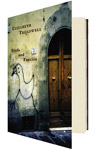This chiming, fragmentary, powerful work is in almost every sense a charm. An informally friendly attitude, a spell to keep bad things away, a chant that summons spirits, a child’s rhyming game, a magic disguise, a small, bright bracelet or ornament—charm can mean all those things, and all make good analogies for most of these sparkling poems.
Enraptured by small objects, and by the conversations of little kids, Treadwell has learned to create many kinds of short poems: anecdotes, descriptions (as on postcards), greetings, love notes, witty remarks. Some of these poems explain how the rest work—here’s one ars poetica that has grown on me, entitled “Dinosaur Meat”: “shy gifty, I felt snubbed. // poetry’s like a small dried sponge seeped in time, / tongued at leisure (in peril) at safety (in chains) // we press ourselves to the earth.” Other poems incorporate lullabies, baby talk, toddlers’ coinages, and a microscopist’s intimate scrutiny of plants, animals, and interpersonal gestures. Treadwell gathers such things into lines and stanzas that collect and compare eco-worries and maternal fears: “into the global anxiety box / we put cigarettes, gumdrops, & dust; // ice chips; birthstones; // glasses of water.”
Though she also portrays friendships among adults, the depictions of children, and their voices, stand among Treadwell’s triumphs: “far a girl can walk herself to kindergarten these days / in most kinds of western weather / with a glimpse toward the dustbinny wishing well.” In their imaginary family shelter, “all our gliding, loose particularities” make of mother and children a “sweet protectorate, / and broody.” The poems stand as far as they can from the cold dictates of adult necessity, reason, government, patriarchy, authority. They feel as nonlinear as a skein of string, as spontaneous as the toddlers they quote: “‘are we gentlemen?’ / said Ivy // ‘am I a lassie?’”
To say that the poems seem vivid, firsthand, or even raw is not to deny their roots in prior writing. Treadwell invokes a history of women who have tried to remake the language, from Margaret Cavendish to Gertrude Stein, the Irish writer Medbh McGuckian (whom she quotes), and the underrated Wisconsin poet Lorine Niedecker. Children’s language and American detail join easily, if never seamlessly, to exultant archaism, celebrating rather than rejecting a transatlantic lyric heritage: dandelion fluff is “borne by the tides like sprites / & false things, a thousand /...
You have reached your article limit
Sign up for a digital subscription and continue reading all new issues, plus our entire archives, for just $1.50/month.
Already a subscriber? Sign in





